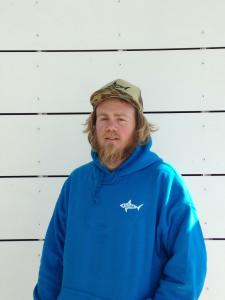Jake Griffin

Young Fishermen in the Northeast United States
Interviews with 39 fishers between the ages of 18-35, located along the US East Coast from Maine to North Carolina. Collectively, they represent a wide variety of gear types and fisheries. All had been fishing full-time for at least two years and wanted to make fishing their career. They describe motivations for choosing a fishing career, strategies used, barriers encountered, and facilitating factors that have enabled interviewees to defy the graying trend to become successful fishermen.
Please visit the Voices SoundCloud page to explore clips and stories that relate to this collection.
Sarah Schumann
Jake Griffin, 27 years old at the time of the interview, is a North Carolina fisherman specializing in niche fisheries such as shark fishing and the haul seine fishery (a traditional method of fishing from the beach with a skiff and a truck). Located at an ecological boundary, he targets various populations of sharks as they migrate down from the North and up from the South throughout the year. Jake's biggest worry is that public misunderstanding about the shark fishery will lead to management measures that shut him out of the fisheries he has invested in.
Scope and Content Note
In the interview, Jake Griffin discusses his life as a third-generation commercial fisherman in North Carolina, focusing on his involvement in the shark fisheries. He explains how he grew up fishing and decided to pursue it as a full-time career. He describes the diversity of his fishing activities, which include shark fishing, longlining, and gillnet fishing for various species. Jake emphasizes the challenges he faces in finding a market for his shark catch, especially after some fish houses stopped dealing with sharks due to stricter regulations. He shares his efforts to sell his fish locally and establish connections with buyers, but acknowledges the difficulties faced by younger fishermen trying to enter the industry with well-established relationships between dealers and buyers. He also notes the growing importance of consumers wanting to know where their seafood comes from and the story behind it and talks about how some fish dealers are using technology to allow customers to track the source of their fish back to the boat and the location where it was caught.
Jake advocates for more public education to dispel myths about the shark fishery and promote the sustainable practices employed by U.S. fishermen. He believes that educating the public about the viability of the shark fishery and other fish species would alleviate the stress on other fisheries and encourage more participation. He also notes the need for greater cooperation between fishermen and scientists to ensure the long-term health of fisheries and protect the livelihoods of future generations and suggests that involving fishermen in scientific research and management decisions could bridge the gap and instill more confidence in the industry's future. Jake also discusses the impact of social media on public perceptions of fisheries, stressing the importance of better communication and education to combat negative portrayals.
Jake participated in North Carolina Sea Grant's Fish Camp and describes the importance of having a proactive attitude towards engaging in fisheries science and management. "It takes an open mind to be able to participate in the fisheries and be able to see a future for the fisheries," he says. "I do have a different mindset where a lot of people just want to fight. 'Don’t let them. They’re going to take this from us. They’re going to take that from us. They’re going take this. Don’t back down an inch.' But, you know, you see those same people hitting a brick wall. They fight and they just ram that brick wall as hard as they can go. I’m in that crowd because I want it to keep going. But I also see the end of the wall. You can go around that wall. Work with science."
Please Note: The oral histories in this collection are protected by copyright and have been created for educational, research and personal use as described by the Fair Use Doctrine in the U.S. Copyright law. Please reach out Voices@noaa.gov to let us know how these interviews are being used in your research, project, exhibit, etc. The Voices staff can help provide other useful resources related to your inquiry.
The NOAA mission is to understand and predict changes in climate, weather, oceans, and coasts, to share that knowledge and information with others, and to conserve and manage coastal and marine ecosystems and resources. The Voices Oral History Archives offers public access to a wide range of accounts, including historical materials that are products of their particular times, and may contain offensive language or negative stereotypes.
Voices Oral History Archives does not verify the accuracy of materials submitted to us. The opinions expressed in the interviews are those of the interviewee only. The interviews here have been made available to the public only after the interviewer has confirmed that they have obtained consent.
